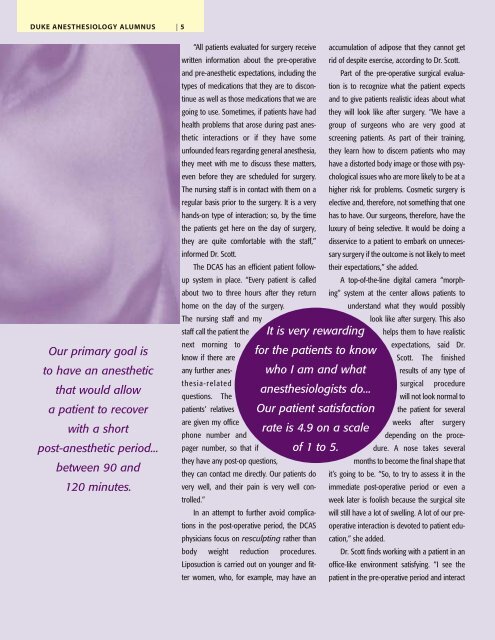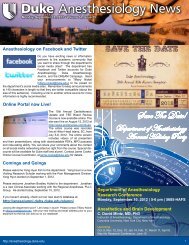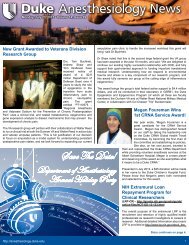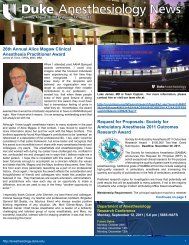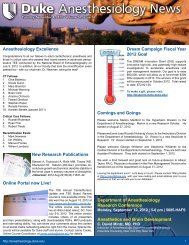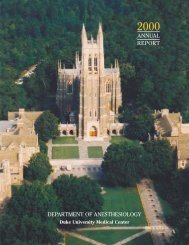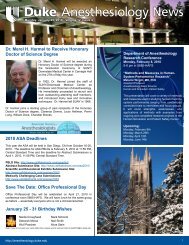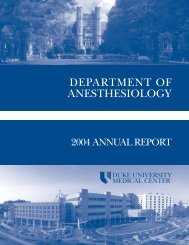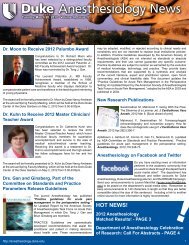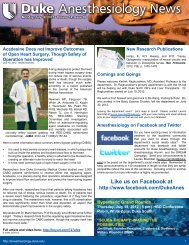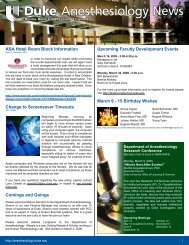04 wint anes alum single pgs - Department of Anesthesiology - Duke ...
04 wint anes alum single pgs - Department of Anesthesiology - Duke ...
04 wint anes alum single pgs - Department of Anesthesiology - Duke ...
Create successful ePaper yourself
Turn your PDF publications into a flip-book with our unique Google optimized e-Paper software.
DUKE ANESTHESIOLOGY ALUMNUS | 5<br />
Our primary goal is<br />
to have an <strong>anes</strong>thetic<br />
that would allow<br />
a patient to recover<br />
with a short<br />
post-<strong>anes</strong>thetic period...<br />
between 90 and<br />
120 minutes.<br />
“All patients evaluated for surgery receive<br />
written information about the pre-operative<br />
and pre-<strong>anes</strong>thetic expectations, including the<br />
types <strong>of</strong> medications that they are to discontinue<br />
as well as those medications that we are<br />
going to use. Sometimes, if patients have had<br />
health problems that arose during past <strong>anes</strong>thetic<br />
interactions or if they have some<br />
unfounded fears regarding general <strong>anes</strong>thesia,<br />
they meet with me to discuss these matters,<br />
even before they are scheduled for surgery.<br />
The nursing staff is in contact with them on a<br />
regular basis prior to the surgery. It is a very<br />
hands-on type <strong>of</strong> interaction; so, by the time<br />
the patients get here on the day <strong>of</strong> surgery,<br />
they are quite comfortable with the staff,”<br />
informed Dr. Scott.<br />
The DCAS has an efficient patient followup<br />
system in place. “Every patient is called<br />
about two to three hours after they return<br />
home on the day <strong>of</strong> the surgery.<br />
The nursing staff and my<br />
staff call the patient the<br />
next morning to<br />
know if there are<br />
any further <strong>anes</strong>thesia-related<br />
questions. The<br />
patients’ relatives<br />
are given my <strong>of</strong>fice<br />
phone number and<br />
pager number, so that if<br />
they have any post-op questions,<br />
they can contact me directly. Our patients do<br />
very well, and their pain is very well controlled.”<br />
In an attempt to further avoid complications<br />
in the post-operative period, the DCAS<br />
physicians focus on resculpting rather than<br />
body weight reduction procedures.<br />
Liposuction is carried out on younger and fitter<br />
women, who, for example, may have an<br />
It is very rewarding<br />
for the patients to know<br />
who I am and what<br />
<strong>anes</strong>thesiologists do...<br />
Our patient satisfaction<br />
rate is 4.9 on a scale<br />
<strong>of</strong> 1 to 5.<br />
accumulation <strong>of</strong> adipose that they cannot get<br />
rid <strong>of</strong> despite exercise, according to Dr. Scott.<br />
Part <strong>of</strong> the pre-operative surgical evaluation<br />
is to recognize what the patient expects<br />
and to give patients realistic ideas about what<br />
they will look like after surgery. “We have a<br />
group <strong>of</strong> surgeons who are very good at<br />
screening patients. As part <strong>of</strong> their training,<br />
they learn how to discern patients who may<br />
have a distorted body image or those with psychological<br />
issues who are more likely to be at a<br />
higher risk for problems. Cosmetic surgery is<br />
elective and, therefore, not something that one<br />
has to have. Our surgeons, therefore, have the<br />
luxury <strong>of</strong> being selective. It would be doing a<br />
disservice to a patient to embark on unnecessary<br />
surgery if the outcome is not likely to meet<br />
their expectations,” she added.<br />
A top-<strong>of</strong>-the-line digital camera “morphing”<br />
system at the center allows patients to<br />
understand what they would possibly<br />
look like after surgery. This also<br />
helps them to have realistic<br />
expectations, said Dr.<br />
Scott. The finished<br />
results <strong>of</strong> any type <strong>of</strong><br />
surgical procedure<br />
will not look normal to<br />
the patient for several<br />
weeks after surgery<br />
depending on the procedure.<br />
A nose takes several<br />
months to become the final shape that<br />
it’s going to be. “So, to try to assess it in the<br />
immediate post-operative period or even a<br />
week later is foolish because the surgical site<br />
will still have a lot <strong>of</strong> swelling. A lot <strong>of</strong> our preoperative<br />
interaction is devoted to patient education,”<br />
she added.<br />
Dr. Scott finds working with a patient in an<br />
<strong>of</strong>fice-like environment satisfying. “I see the<br />
patient in the pre-operative period and interact


